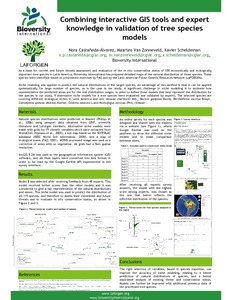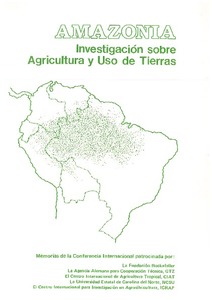Claiming the forest: Punan local histories and recent developments in Bulungan, East Kalimantan
This book focuses primarily on changes that have taken place in the Malinau area in East Kalimantan in recent years. The Punan Malinau, who inhabit the area, are former nomads who subsist on a wide range of forest-oriented activities, including swidden agriculture, hunting and the collection of and trade in forest products. During the past ten years, the arrival of a growing number of powerful outsiders, including NGO's, timber and mining companies, has contributed to increasing competition for land and for various new sources of income.
Community forest management as a carbon mitigation option: case studies
Conferencia sobre Investigación Agrícola y Uso de la Tierra en la Amazonía (1980, Cali, Colombia). Amazonia: investigación sobre agricultura y uso de tierras: memorias
Dampak desentralisasi kehutanan terhadap keuangan daerah, masyarakat setempat dan tata ruang: studi kasus di Kabupaten Bulungan, Kalimantan Timur
The report describes the impacts of forestry decentralization on district finance, local communities and spatial planning, drawing on an 18-month research project in Bulungan District in East Kalimantan Province. It describes forestry management policies following the implementation of regional autonomy, and their impacts on district revenue and local livelihoods. The authors analyze district spatial planning, forest land use and community control over forest lands.
Decentralisation of policies affecting forests and estate crops in Kutawaringin Timur district, Central Kalimantan
Kotawaringin Timur district lies within the Dayak heartland of Central Borneo, Indonesia. Prior to the late 1960s, most of the district was covered in dense tropical forest. However, these forests have been increasingly exploited since the 1970s when former-president Soeharto granted large timber concessions to logging companies in the area. Although Kotawaringin Timur’s forests still supply 49 percent of Central Kalimantan’s log production and half of its sawn timber and moulding, its forest resources are close to being exhausted.
Decentralization of forest administration in Indonesia: implications for forest sustainability, economic development and community livelihoods
Since the collapse of Soeharto’s New Order regime in May 1998, Indonesia’s national, provincial, and district governments have engaged in an intense struggle over how authority and the power embedded in it, should be shared. How this ongoing struggle over authority in the forestry sector will ultimately play out is of considerable significance due to the important role that Indonesia’s forests play in supporting rural livelihoods, generating economic revenues, and providing environmental services.




